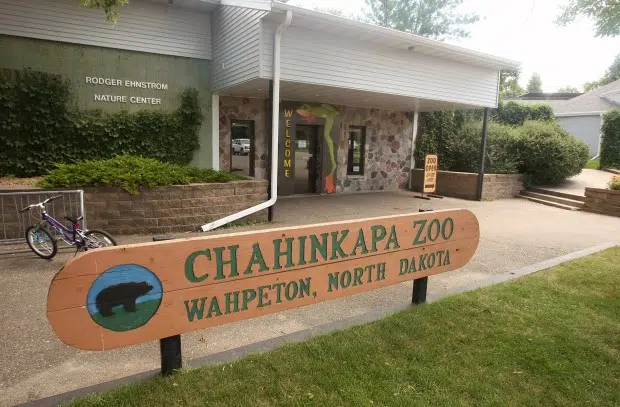
WAHPETON, N.D. (KFGO) – Former employees of Chahinkapa Zoo in Wahpeton are speaking out about what they allege they saw and experienced while employed there – claims that surfaced after Chahinkapa lost its national accreditation from the Association of Zoos and Aquariums.
Many of the former employees were reluctant to go on record saying they will face repercussions from Chahinkapa Zoo management.
“I still have fear for my career,” one employee said. “The zoo community is small and word travels fast.”
Monica Demke worked as a keeper at Chahinkapa from 2010-2013.
“I love Chahinkapa Zoo,” Demke said. “I spent every summer from the time I was very small either visiting the zoo or volunteering several days a week. When I became a zookeeper, it was the proudest moment of my life. In telling my story, my intention is not to hurt Chahinkapa, nor is it to stage a personal attack on those who have managed Chahinkapa for so long. Rather, it is my hope to raise community support for our zoo so it can improve.”
Demke said former employees communicated concerns to management.
“People may wonder why we didn’t come forward earlier or might accuse us of just being disgruntled ex-employees who are out for blood,” Demke said. “We tried to discuss our concerns while we were employed at Chahinkapa. We wanted to make a difference and offered some viable solutions to the problems we faced. These were often brushed aside as our leaders did not have the time to sit down with us and properly analyze those concerns and discuss solutions.”
The breakdown in communication could be attributed to the management team’s full workload, according to Demke.
“At times we felt leaderless because our management team was so busy trying to run the day-to-day management of the zoo, be zoo ambassadors in the community, and fulfill numerous other responsibilities, that at times it couldn’t all be juggled,” Demke said. “There was a severe breakdown of communication between management and zoo-keeping staff. We discovered we had to just make the best of what we had to work with and do our best to keep the place functioning. Over time, it became easier to keep our heads down.”
Although Demke is no longer employed at Chahinkapa Zoo, she feels a need to speak out about the experiences she had there and bring awareness to the situation.
“We may not walk the pathways and scrub the exhibits anymore, but a part of our hearts will always be with Chahinkapa,” Demke said. “I, for one, am ashamed that I didn’t do more to raise awareness when I was an employee and see this as an opportunity to raise community support for our zoo so it can improve.”
Safety was also a concern at the zoo. Multiple former staff members were injured while on duty.
“We also had situations that were not safe for staff and the animals we were caring for,” Demke said. “While I was employed at Chahinkapa, we had a young bison that needed to be bottle-fed, so one keeper would go into the exhibit with him and the other would stand on the other side of the fence holding him on a lead rope. This bison was far too large for a 105 lb. female to safely hold. I was dragged halfway over the fence and as I was pulled, I felt a horrible pain in my right shoulder. I went to management to let them know what happened. It was suggested that I not file for workman’s comp because it was a lot of paperwork, and it might make the zoo look bad if we had accidents.
Demke didn’t seek immediate medical attention.
“It progressed to the point where I struggled to raise my arm above my head some days, and it was only after constant chiropractic care and significant rehab that I have healed properly,” Demke said. “When I decided to leave the zoo and cited this injury as a large reason why I was leaving, management said that I had never told them I was injured and placed the blame on me for the lack of communication. I had no paperwork to prove my side of the story as I did not file workman’s comp out of the belief that I was protecting the zoo.”
Jessie Monson was a keeper at Chahinkapa from January 2014 to May 2015. She said she was involved in an animal attack incident while employed at the zoo.
“My personal injury story still rattles me,” Monson said. “I was attacked by a Fossa. After a history of some behavior issues from the Fossa, a few of us zookeepers were still required to go into holding with this animal to try to contact work with the Fossa, and to kennel the animal to move it in and out of an unfit enclosure from its inside to outside exhibit. One day, the animal attacked, injuring me and a co-worker that tried to help get me out of the situation. I won’t speak for the other person. I still have damage to my hand due to the lacerations received that day. My hand has scars, cramping issues, soreness related to the old injury, and weakness years later.”
Like Demke, Monson said zoo leadership placed the blame on her.
“I was then told that I must have done something wrong, I was inadequate, in the moment of the attack I could have stopped it, why did I let this happen to myself and the other people,” Monson said. “There was not much compassion from leadership, just trying to point blame.”
Monson said it has been difficult to come forward since she still lives and works in Wahpeton and fears retaliation from zoo leadership toward herself or her family. She believes she’s not the only person who feels this way.
“The gaslighting that went on there has scared many individuals worse than what physical injuries some of us may have received,” Monson said.
Demke said no single person is responsible for what has been happening at Chahinkapa Zoo.
“As disappointed as I am in how these situations were handled, I’m not trying to assign blame to any one individual,” Demke said. “I believe almost everyone who chooses a career in the zoo world is not in it for the money. Most are passionate, hardworking people who love the animals and only want the best for them. I don’t think the management team at Chahinkapa is evil, but I do think they could use help from the community and that changes need to be implemented to properly address concerns.”
Another former zookeeper, Melissa Nelson, worked at the zoo from the summer of 2013 to the spring of 2016.
“Chahinkapa Zoo was without a doubt the most toxic work environment I have ever experienced,” Nelson said. “Working there caused extreme anxiety and reawakened my OCD that I still struggle with years later. It was my dream career to be a zookeeper, but Chahinkapa Zoo was such a terrible experience that after I left, I never worked in a zoo again.”
Nelson claims the issues at Chahinkapa Zoo extend beyond basic safety concerns.
“A blatant example of a lack of consideration of animal welfare was a ‘Zombie Paintball’ event that the zoo hosted,” Nelson said. “This was an event where guests would pay to shoot Zombies with paintballs around the zoo. The Zombies were employees and volunteers. This event was on the zoo grounds after-hours. The noise from the paintball guns terrified the animals and the next morning, many of the animal exhibits were splattered with paint. Keepers would often clock out early even if they still needed to keep working because you would get in trouble for overtime hours.”
Nelson went on to say employees were often made to volunteer their time when various events were held at the zoo.
“One of these events was their yearly fundraiser, the Wild Game Shows, during which management would encourage female employees to dress scantily or ‘sexy’ in order to increase ticket sales,” Nelson claimed.
Chahinkapa Zoo Director Kathy Diekman responded to the accusations.
“Through the years we have had some disgruntled employees, but none were disgruntled on-site,” Diekman said. “They leave under good wishes and then all of a sudden there’s collusion formed, or something happens and it gets built up. Even if I could comment on them as individuals, I would not because it’s unprofessional.”
Diekman said when incidents happen at Chahinkapa Zoo, management investigates the causes and discusses solutions.
“When something does happen – and it’s been very few accidents at Chahinkapa – we look at the protocol and what went wrong,” Diekman said. “Who did this, and how do we remedy this? There was a [Fossa attack] that we looked at – the error in the keeping – that does not make that individual inept, it was an error. When that happened, that whole program and how we did that was stopped.”
Diekman said Chahinkapa Zoo will move on from this and look to the future.
“You know where we are, if you have an ax to grind if you’re uncomfortable with something come see us,” Diekman said. “We’re an open book and we wish everybody well. There’s a lot of untruths out there and to sit behind my keyboard and fire back is not making any progress. We’ve received mountains of testimony from people both on social media and personally saying keep on keeping on and we’re gonna support the zoo even more. We always learn from things and we always do better. We’re here, we’re not going away. We’ve got some great things coming up in 2022 and beyond.”
Diekman says the zoo is not governed by the AZA, and that it is a “choice to join the organization” and that the zoo was in good standing with the AZA for 25 years. The AZA inspection did not contain any concerns about animal health or welfare. Diekman says the zoo will remain open and work with the USDA and the North Dakota State Board of Animal Health going forward.




Comments